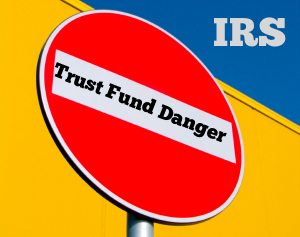At Lefstein-Suchoff CPA & Associates, we are committed to providing useful information that helps those faced with a situation requiring tax help for: tax settlements, tax debt, back taxes, IRS tax debt, an IRS levy, IRS tax audits, Offer in Compromise, IRS tax lien, etcetera.
To encourage prompt payment of withheld income and employment taxes, including social security taxes, railroad retirement taxes, or collected excise taxes, Congress passed a law that provides for the TFRP. These taxes are called trust fund taxes because you actually hold the employee’s money in trust until you make a federal tax deposit in that amount. The TFRP may apply to you if these unpaid trust fund taxes cannot be immediately collected from the business. The business does not have to have stopped operating in order for the TFRP to be assessed.
Who Can Be Responsible for the TFRP
The TFRP may be assessed against any person who:
- is responsible for collecting or paying withheld income and employment taxes, or for paying collected excise taxes, and
- willfully fails to collect or pay them.
A responsible person is a person or group of people who has the duty to perform and the power to direct the collecting, accounting, and paying of trust fund taxes. This person may be:
- an officer or an employee of a corporation,
- a member or employee of a partnership,
- a corporate director or shareholder,
- a member of a board of trustees of a nonprofit organization,
- another person with authority and control over funds to direct their disbursement, or
- another corporation or third party payer.
For willfulness to exist, the responsible person:
- must have been, or should have been, aware of the outstanding taxes and
- either intentionally disregarded the law or was plainly indifferent to its requirements (no evil intent or bad motive is required).
Using available funds to pay other creditors when the business is unable to pay the employment taxes is an indication of willfulness. At Lefstein-Suchoff CPA & Associates, LLC, we have successfully appealed and won erroneous trust fund assessments. In other cases we have provided collection solutions to assist with a TFRP assessment.
You may be asked to complete an interview in order to determine the full scope of your duties and responsibilities. Responsibility is based on whether an individual exercised independent judgment with respect to the financial affairs of the business. An employee is not a responsible person if the employee’s function was solely to pay the bills as directed by a superior, rather than to determine which creditors would or would not be paid.
Figuring the TFRP Amount
The amount of the penalty is equal to the unpaid balance of the trust fund tax. The penalty is computed based on:
- The unpaid income taxes withheld, plus
- The employee’s portion of the withheld FICA taxes.
For collected taxes, the penalty is based on the unpaid amount of collected excise taxes.
Assessing the TFRP
If the IRS determines that you are a responsible person, they will provide you a letter stating that they plan to assess the TFRP against you.
Once the IRS asserts the penalty, they can take collection action against your personal assets such as to file a federal tax lien or take levy or seizure action.
At Lefstein-Suchoff CPA & Associates, LLC, we have successfully appealed and won erroneous trust fund assessments. In other cases we have provided collection solutions to assist with a TFRP assessment.
If you need IRS help and have unresolved cases with previous tax lawyers and tax attorneys, we can help find an optimal resolution for your indigenous needs. Contact us at 201-947-8081 or 646-688-2807, or email us at info@irstaxproblems.com.


